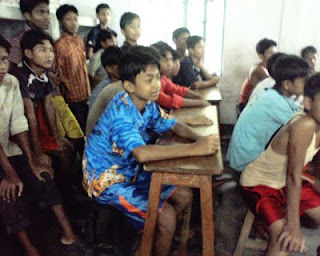 |
| "Taking possession" |
Today, November 27, 2013, has been an outstanding day for us. It was the day in when we have finally been able to purchase the land on which to build our dream. A beautiful plot in the municipality of Moulovibazar, filled with trees, with a creek crossing it from North to South, adjacent to a tea plantation, and that meets all the conditions to make our project of providing secondary education to the tea workers children. In the morning the deed of sale between the owner and the Diocese of Sylhet was signed; in the afternoon, following the bengali tradition, Brothers Marti Enrich and Eugenio Sanz went to the plot to "take possession" officially. Then we have made a duty visit to the owner, Mr. Mahfuj Chowdury, descendant of the last zamindar of the area (the zamindars were traditionally aristocrat landowners). We must thank God for the purchase of the land and to all those who have made it possible with their donations, difficult task because the NGOs never help to the purchase of land. But this is only the beginning, now we have to continue raising funds for the construction of the school. Some NGOs seem favorable to contribute, such as SED and Manos Unidas. Let us hope that some others also will help, as well as private institutions and donors. Tea plantations children deserve an education that so far is forbidden to them, an education that would open for them the doors of a worthy future. From this post, I encourage everyone to help us, to help these boys and girls, contributing economically and spiritually to this cause, which cannot be more human, or more Christian.
El día de hoy, 27 de noviembre de 2013, ha sido excepcional para nosotros. Ha sido el día en el que por fin hemos podido adquirir el terreno en el que construir nuestro sueño. Una parcela preciosa en el término municipal de Moulovibazar, llena de árboles, con un riachuelo que la cruza de norte a sur, colindante con una plantación de té, y que reúne todas las condiciones para que nuestro proyecto de dotar de educación secundaria a los hijos de los trabajadores del té se convierta en realidad. Por la mañana se ha firmado la escritura de compraventa entre el propietario y la diócesis de Sylhet, por la tarde, siguiendo la costumbre bengalí, los Hermanos Marti Enrich y Eugenio Sanz hemos ido a la parcela a “tomar posesión” oficialmente. Acto seguido hemos hecho una visita de cortesía al hasta ahora propietario, el Sr. Mahfuj Chowdury, descendiente del último zamindar de la zona (los zamindares eran tradicionalmente aristócratas terratenientes). Hay que dar gracias a Dios por la compra del terreno y a todas las personas e instituciones que lo han hecho posible con sus donaciones, tarea difícil porque las ONGs nunca ayudan en la compra de terrenos. Pero esto no es más que el principio, ahora hay que seguir recaudando fondos para la construcción de la escuela. Algunas ONGs se han mostrado favorables a contribuir, como SED y Manos Unidas. Esperemos que algunas otras también lo hagan, así como instituciones y donantes privados. Los niños de las plantaciones de té se merecen una educación que hasta ahora les está vedada y que les abra las puertas de un porvenir digno. Desde estas líneas animo a todos a ayudarnos, a ayudar a estos niños y niñas, contribuyendo económicamente y espiritualmente a esta causa, que no puede ser más humana, ni más cristiana.
 |
| Duty visit to Mr. Chowdury |
 |
| Witnessing the signature |
.jpg)

.JPG)






.JPG)
.JPG)

.JPG)














.jpg)









.jpg)
.jpg)
.jpg)

